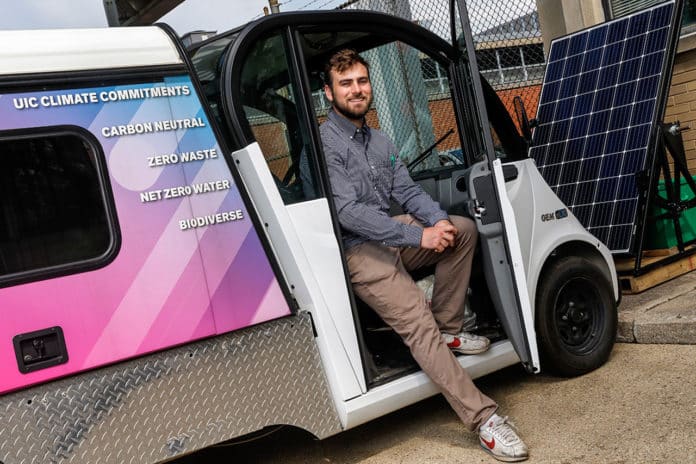A team of students from the University of Illinois Chicago (UIC) has designed and built a solar charging station for Gemma, an electric vehicle used by the Office of Planning, Sustainability, and Project Management.
Gemma makes deliveries for the Food Recovery Network, which addresses hunger and food waste. With Gemma, the network recovers perfectly good food from the campus dining halls that would otherwise be thrown out and donates it to partner shelters throughout Chicago.
The organization was founded in the fall of 2020 and delivered over 7,500 pounds (3,400 kg) of food to the homeless shelters in the city that year. Now the volume of food delivery is going to be done with zero emissions, even from generating the electricity to charge it.
The sustainability office proposed the project to the students in 2020. The team – consisting of Joe Downie, Kevin Georgiev, and Matt Steinwart, all students in mechanical engineering, as well as Kemuel Roberts, a biomedical engineering student – took up the challenge and started working on the project.
The work hit a standstill when campus facilities were closed due to COVID-19, which affected the automotive sector at large. “Another issue was supply chain issues during COVID,” Downie said. “We waited three months for a trailer to come in that we ordered. We canceled the order and transitioned to a stationary system.”
Undeterred, the students regrouped and devised a plan to work online and from home as much as they could. When facilities reopened, the team went to work in the Makerspace cutting materials, then welded them in the machine shop.
“To charge Gemma off-grid, we implemented a 300-watt solar panel. The solar panel charges a battery that is used to charge Gemma at night,” Downie said. “The charge station implements manual solar tracking, and it has 12 settings so that it is angled to be most efficient for each month.”
The team is still considering the possibility of transitioning the station onto a trailer for mobile use.
